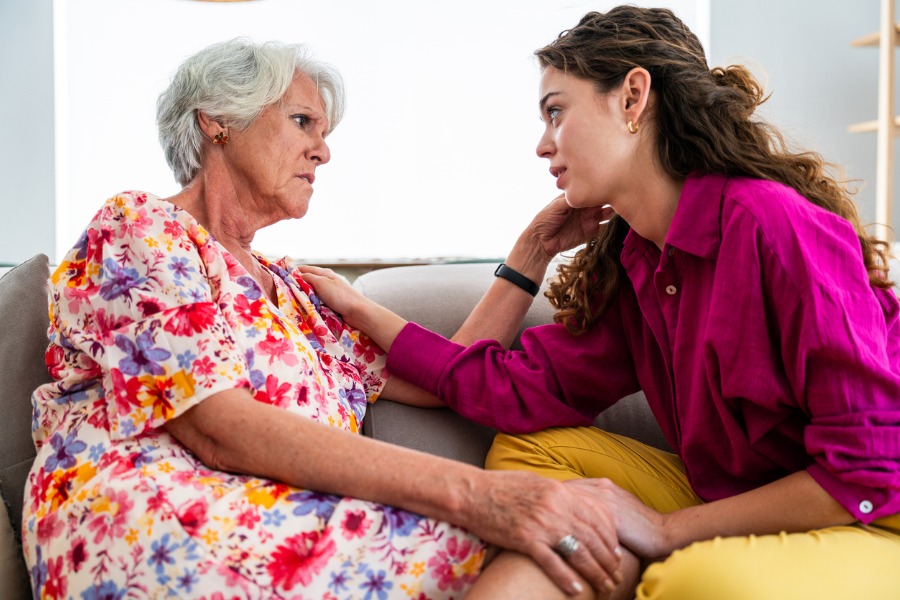
It’s time to talk about mental health with a senior loved one. Mental health is a significant aspect of well-being, especially as people age. Seniors often face challenges like physical health changes, the loss of close friends, and increasing feelings of loneliness. These issues can lead to mental health conditions such as depression and anxiety, which can significantly diminish their quality of life. Addressing these concerns through open and supportive conversations helps create an environment where seniors feel understood and valued.
When discussing mental health with your senior loved ones, you foster a sense of safety and trust that encourages them to share their thoughts and emotions. This enhances their mental and emotional health and contributes to a happier, more fulfilling life.
This article proposes practical advice on approaching a talk about mental health with your senior loved one, ensuring they receive the attention and care they deserve.
How to Start Mental Health Conversations
When family caregivers talk about mental health with seniors, it’s vital to approach the topic with understanding and empathy. Starting a conversation about the challenges of dementia and other mental health concerns with an aging loved one requires careful consideration. Choose a quiet place where interruptions are unlikely, such as a living room or a cozy corner of their home. It helps create a healthy atmosphere of trust and security.
Approach the topic delicately to avoid making your loved one feel defensive. Start with a gentle question or a concern you’ve noticed. For instance, you could say, “I’ve noticed you seem a bit down lately. How have you been feeling?” This approach shows that you care and are genuinely interested in their well-being.
Timing is also significant. Avoid bringing up the conversation when they are stressed or preoccupied. Instead, choose a moment when they are relaxed and in a good mood. It will increase the likelihood that they will be receptive and willing to share their thoughts and feelings, making the conversation more productive and meaningful.

Addressing Common Mental Health Issues
Seniors often face specific mental health challenges that can be difficult to recognize and address. Depression and anxiety are common, sometimes triggered by life changes, isolation, or health issues. Cognitive decline, such as memory loss, can also affect their well-being. Physical ailments or changes in behavior often disguise these conditions.
Common issues such as depression, anxiety, and cognitive decline can sometimes be linked to the misuse of prescription drugs, which is a growing concern among older adults. Seniors may misuse medications due to factors like confusion about dosages, seeking relief from chronic pain, or attempting to self-manage mental health symptoms.
Recognizing these risks is crucial to providing appropriate support, encouraging open communication, and ensuring seniors receive suitable care and guidance to maintain their mental and physical well-being.
Using Compassionate and Supportive Language
Using compassionate and supportive language is vital when you talk about mental health with a senior loved one. Empathetic phrases help create a safe space for them to share their feelings. For example, saying, “I’m here for you, and I want to understand what you’re going through,” shows care and concern without being intrusive or judgmental.
Avoid language that might make them feel judged or criticized. Instead of saying, “You shouldn’t feel that way,” you could express understanding by saying, “It’s okay to feel like this; let’s talk about it.” This approach reassures them that their emotions are valid and that you are there to support them. It might encourage them to start practicing self-care.
Keep in mind that patience is essential. Listening is more important than speaking in mental health conversations. Give them the time to open up, and avoid rushing the conversation. Doing so will create an environment where they feel heard and supported.

Involving Healthcare Professionals: When and How to Seek Help
It’s important to stress that professionals can provide accurate diagnoses and effective treatment options that significantly improve quality of life. Talk about mental health with your senior loved ones in a way that helps them understand the value of seeking professional help. Explain that mental health requires the same care and attention as they would consult a doctor for physical ailments.
Here are some tips to encourage seniors to attend appointments or therapy sessions:
- Choose a healthcare provider they trust: Familiarity can ease their anxiety about seeking help.
- Offer to accompany them to appointments: Your presence can provide comfort and reassurance. If you can’t go with them, ask a professional caregiver to accompany them to appointments.
- Discuss the benefits of treatment: Highlight how therapy or medication can improve their daily life.
Involving professionals guarantees that your loved ones receive the best care for their physical and mental health.

Supporting Your Senior Loved One Through Treatment
To support your senior loved one through treatment, you must understand the options available and offer ongoing encouragement. Treatment for mental health can include therapy, medication, or lifestyle changes like increased physical activity or social engagement. Each of these approaches has an important role in improving mental well-being.
Stay engaged and supportive to help your loved one follow their treatment plan. You can assist them in scheduling appointments, remind them to take medications, or even participate in therapy sessions if appropriate. This active involvement shows that you care and are committed to their well-being.
Remain involved in their ongoing care. Regularly check in on their feelings, ask about their progress, and encourage them to continue their treatment. Being a consistent source of support can make a big difference in their recovery journey.
Creating a Supportive Environment at Home
Creating a supportive home environment can significantly impact the mental and emotional well-being of your senior loved one. Make their living space a place where they feel safe, comfortable, and valued. Start by encouraging open communication, where they can express what they think and how they feel freely and without fear of judgment.
Engage them in activities that promote mental well-being, such as hobbies they enjoy or regular social interactions with friends and family. These activities can provide a sense of purpose and connection, essential for maintaining mental health. Establishing a daily routine can offer stability and predictability, which can comfort seniors. Encourage them to incorporate physical activity into their routine, whether daily walking, yoga, or light exercise.
Personal caregiver support can facilitate these activities, ensuring your senior loved one stays socially active and mentally engaged. Incorporating in-home care and personal caregiver support will make their living space feel safe, comfortable, and nurturing, providing emotional care and ensuring your loved one’s safety and independence.
How In-Home Care Benefits Senior Mental Health
In-home senior care offers personalized support tailored to your senior loved one’s needs. It helps prevent feelings of isolation through consistent companionship and daily interaction. Regular social engagement is essential for maintaining a positive outlook, especially for seniors who may otherwise feel disconnected. Respite care also ensures seniors have supervision and support in maintaining their independence.
In-home caregivers can also keep an eye on potential signs of mental health decline, such as sudden mood changes or withdrawal from activities. Of course, in-home caregivers can communicate with doctors if needed to ensure your loved one’s mental and physical health remains balanced. They offer the opportunity for seniors to retain their independence while providing peace of mind regarding their safety and care.
This level of personalized attention from a family caregiver can help seniors feel empowered and in control of their day-to-day lives. This comprehensive support system benefits not only mental health but also overall well-being.
Final Thoughts
Taking the time to talk about mental health with a senior loved ones is a meaningful step toward ensuring their well-being. Set a comfortable environment, use compassionate language, and address the stigma to create a space where they feel supported. Involving healthcare professionals and staying engaged in their treatment further enhances their care.
Creating a supportive home environment with regular routines and activities can vastly improve their mental health. These efforts, combined with genuine care and patience, can make all the difference in the quality of life for your senior loved ones.
If you need professional support for your senior loved one, contact Salus and schedule a complimentary, no-obligation consultation.

